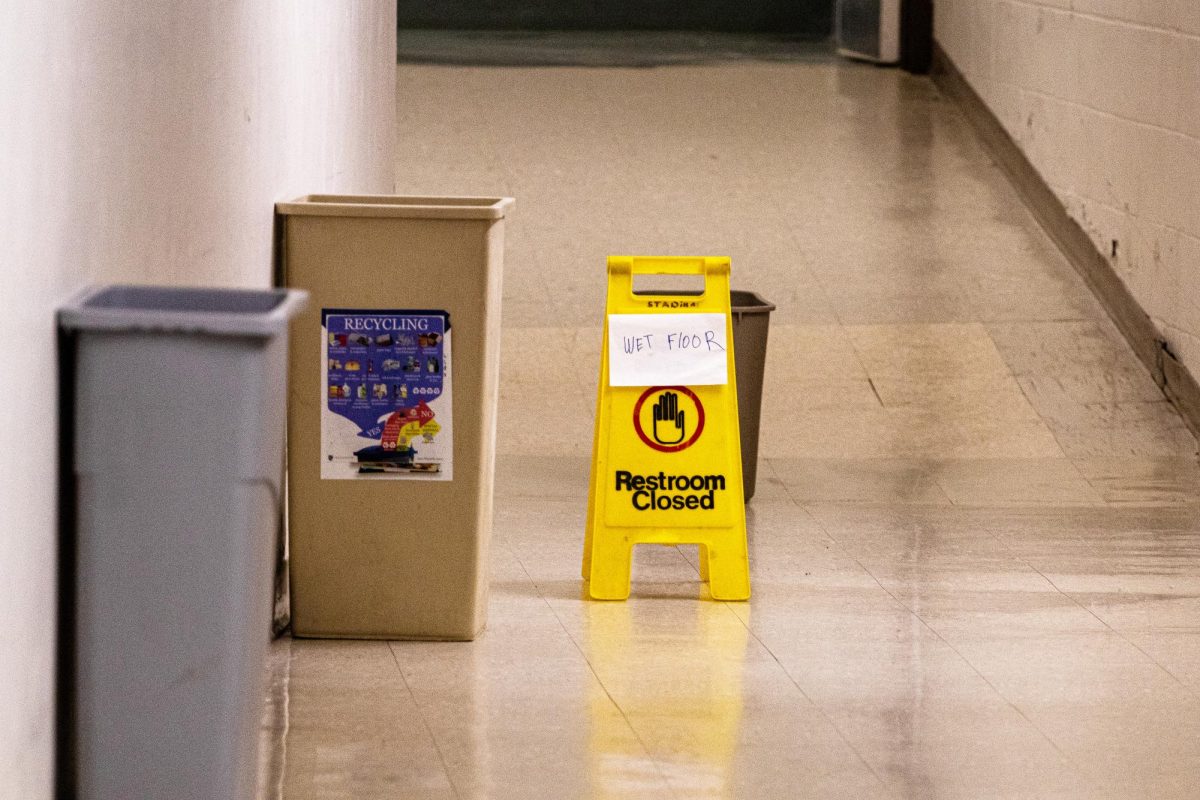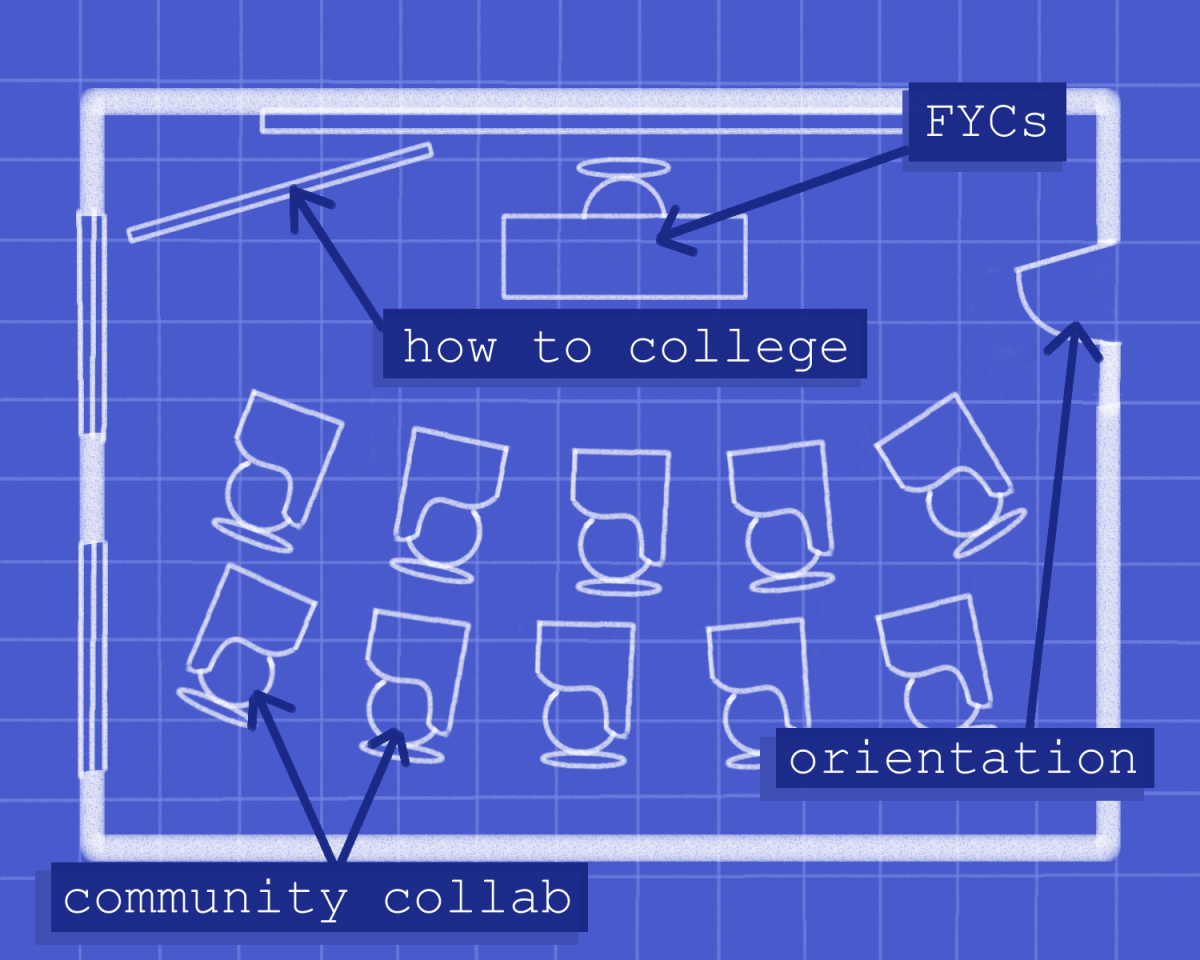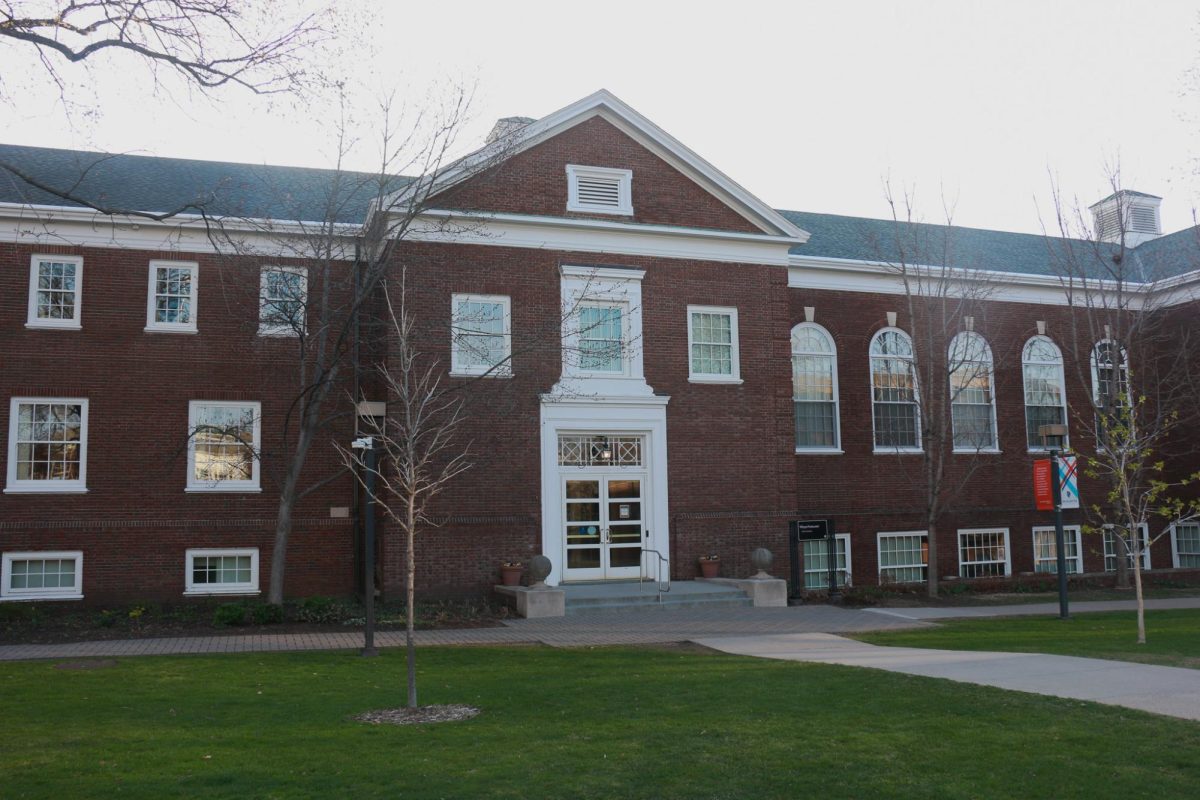Today, over half of all undergraduate students in America identify as female, an encouraging statistic for future gender equality. However, some sections of the country’s higher education institutions remain disproportionate. Women currently make up less than one third of economics majors across all colleges and universities and 39 percent of Macalester’s economics majors.
Macalester’s student organization Women in Economics (WIE) seeks to address the gender discrepancy in the field by acting as a space of encouragement and offering practical help with job opportunities and networking connections. The club is currently lead by co-chairs Millie Baker ’20 and Meera Singh ’19, who work to create a community for female-identifying students interested in pursuing economics at Macalester.
The relationship between gender and economics begins in institutions of higher education and extends into the professional field after graduation. Researchers have called this progression a “leaky pipeline.” This term “refers to the fact that women make up smaller and smaller percentages of the total number of people in economics the higher the level of economic study or faculty position,” Sarah West, professor of economics and chair of the economics department at Macalester, explained.
“Fewer women major in economics compared to the number who take Principles of Economics, and there are a smaller percentage of women tenured professors of economics in academia given what we would expect given the number of women in economics Ph.D. programs,” West said.
One of the primary issues within this “leaky pipeline” is a difference of grade-sensitivity among male- and female-identifying students. To whether she believes this dynamic plays out among economics students at Macalester, Baker responds emphatically, “I absolutely do.” All economics majors at Macalester are required to first take Principles of Economics. Through her interactions with economics students, Baker has noticed a stark difference in how female-identifying students approach the difficulty of the introductory class as opposed to male-identifying students.
“A lot of times when those students are female, I will hear them say ‘I’m not doing too well in this class’ and ‘I’m realizing that I’m not cut out for econ,’” Baker recalled. Meanwhile, she has witnessed male economics majors who, as she puts it, say, “‘Oh yeah I really struggled in Principles [of Economics], but I kept on at it because I liked it or I felt I could keep trying.’”
“It seems that female-identifying students are more likely to be dissuaded from taking more economics classes when they get lower grades in Principles [of Economics],” Amy Damon, an economics professor at Macalester agreed.
“I really feel like I’m witnessing that disparity in how men versus women react to econ culture,” Baker said of this stark difference in grade-sensitivity across genders. This disparity can perhaps be traced back to a dissimilarity in how men and women are influenced before coming to college. For instance, Baker feels she has witnessed the effects of a society which encourages men to internalize a mentality of entitlement whereas women are taught accommodation and hesitancy. In Baker’s experience, this means “Men come into Macalester with the toolkit to be comfortable or forge a place of comfort within the econ community. Women really don’t come in with much of that toolkit,” explained Baker. “I see one of my roles within econ to facilitate that toolkit.”
Gender discrepancy is not unique to economics. As of 2015, women make up only 35 percent of students earning a bachelor’s degree in a STEM related field. As economics relies heavily on quantitative analysis, it may contain many of the same factors which contribute to gender disparities of both economics and STEM subjects.
Baker witnessed a difference in how young male and female students were encouraged to pursue their interest in math related subjects throughout her early education.
“I’ve done math competitions, since I was about ten, and even just starting at the middle school level, it is very male-dominated,” Baker said.“When I got into high school that was even more pronounced.”
This feeling of being one of few women in an environment is common among female-identifying students and professionals in economics as well as STEM fields. “It can be isolating to be the only woman in a professional context,” West said.
“As much as I try not to let that affect my behavior, I can’t help but be conscious of it,” Baker agreed.
Being a woman in a male-dominated field can also act as a practical burden. Like many other fields, networking is an important part of the economic environment. Forming professional connections is vital in furthering one’s career, and this can be a gender-specific barrier.
“There are a lot more opportunities for men and a lot more male-dominated spaces where men can feel comfortable going to network and that’s not as accessible for women,” Baker said.
WIE addresses the lack of gender proportional networking environments by hosting alumni networking events. In these spaces, female-identifying economics students can connect with other female alumnae now working in the field. Baker spoke of a previous networking alumni event hosted by WIE which involved a panel of graduated economics professionals and opportunities for current students to build relationships with them. WIE considers it one of the biggest achievements of the student organization and a “real success.”
Yet, WIE also faces the difficulties of operating in such a broad field as that of economics.
“There are all sorts of different life paths intersecting in the econ department, so it’s hard to balance all of that and provide resources that are amenable to all those different types of people,” Baker said.
“But I definitely think that it’s a worthwhile endeavor to try to do that. I feel like a community that’s based off of all those different things can ultimately make us stronger.”
West views the variety of topics included as a facilitator for increased demographic diversity in economics. “One step towards greater inclusivity that economists are starting to take with greater frequency is to do a better job explaining the breadth of things that economists study, and the way in which we study them,” West said.
“Economics is a tremendously heterogeneous field; there is something in it of interest to nearly everyone, but we don’t always do a good job making this clear,” she continued.
Looking ahead, West hopes that Macalester can continue towards equitable representation among its economics majors.
“I won’t attempt to forecast what will happen to the gender proportions in the field and at Mac,” West said, “but I can predict that continuing to work on making the field and major more inclusive will be a permanent part of our agenda.”
Baker feels optimistic about the future of gender in economics, both at Macalester and beyond. She finds hope through the very nature of the field. “Economics research is about looking at the way social institutions and economic resources are set up and finding the causal links between those things,” Baker said. “So we are in a unique position to study our own flaws in regards to gender and study the material factors that lead to those and the material factors that break through them.”
In order to do so, Baker calls on all those involved in economics to name what is wrong and push for change within the field.
“The number one thing that we need is to take this issue seriously,” Baker emphasized. “We, especially as women in the field, need to stand up and say ‘There are flaws with our culture, and because we love economics, we want to make it a place where everybody can be welcome; where really anybody who wants to do the work can do so without fear that their gender will be an impediment.’”








Molly Carr • Sep 11, 2019 at 1:46 pm
I do like the way you have framed this situation and it does provide me personally a lot of fodder for thought. Nonetheless, coming from what I have experienced, I simply just trust when the comments pile on that folks stay on issue and don’t get started on a tirade of some other news of the day. Yet, thank you for this superb piece and whilst I do not necessarily concur with this in totality, I value the viewpoint.
Joshua Ball • Sep 10, 2019 at 8:09 am
I’ll right away grab your rss as I can’t find your e-mail subscription link or newsletter service. Do you’ve any? Kindly let me know so that I could subscribe. Thanks.
Heather Pullman • Sep 8, 2019 at 9:57 am
I am really glad I have found this info. Nowadays bloggers publish just about gossips and net and this is actually frustrating. A good website with exciting content, that’s what I need. Thank you for keeping this web site, I’ll be visiting it. Do you do newsletters? Cant find it.
Pete Ferderer • Apr 14, 2019 at 10:50 pm
Thanks for the thoughtful follow-up, Millie. You’re pursuing a worthy cause and I have little doubt that you’ll have a positive impact.
Few people who have both male and female children would be surprised by Goldin’s finding. The important question is how should society respond to the falling percentage of male college students. At Macalester the response appears to be apathy. When I began raising this issue over a decade ago, 57 percent of Macalester students were female. Today that number stands at 61 percent (by contrast, 51 percent of Carleton students are female) and female majors outnumber their male counterparts by 3-to-1, or more, in 11 academic departments at Macalester.
So what does the Mac Weekly do in an article that is purportedly “addressing gender representation” at Macalester? It singles out the Economics Department where 39 percent of the majors are female and points to the male “mentality of entitlement” as a key cause of this gaping disparity. This is absurd and symptomatic of the detachment from reality when it comes to the discussion of gender on this and other college campuses.
After flirting with the idea of majoring in psychology, my daughter called from Nebraska the other day to report that she ‘s giving economics a serious look. My advice to her is that economics is a wonderful major that will open up many great opportunities. Give it your best effort and let the chips fall where they may. In the end, your relationships with other people are what matter and no one gives a damn if you got an A.
Millie Baker • Apr 16, 2019 at 1:59 am
I’d 100% agree that the gender imbalance among undergrads is an issue that needs addressing one way or another. I didn’t know this was an issue you’d been active in for so long – I don’t know what you’ve done regarding it, but I’m glad to know you’re raising awareness, and I would love to see this discussed more.
That said, the gender imbalance in the economics field as a whole, and all the issues outlined in the article that go along with that, is an observably real problem that affects all of us in the world of econ. The gender ratio of the school as a whole doesn’t negate the challenges facing women in a male-dominated field and department. To write about these challenges isn’t “singling out” a department, it’s looking at an issue that exists at the department level. (In fact, the Mac Weekly recently ran an opinion piece about a female-dominated department – WGSS – and what can be done to make male students more welcome there.)
The article isn’t titled “Addressing Gender Representation at Mac”, but “Addressing Gender Representation In Economics At Mac And Beyond”. It’s not trying to take away attention from the overall gender imbalance at Mac, but to address a separate issue – one that relates to the field of economics as a whole as well as our department.
Pete Ferderer • Apr 13, 2019 at 9:18 am
Across all fields, females earn 12 percent more PHDs than males. Nationally, 57 percent of college graduates are female. At Macalester, 60 percent of students are female. The majority of tenure-track positions at Macalester are held by females and yet females continue to benefit from affirmative action policy in the hiring process. Are these data also explained by “a society which encourages men to internalize a mentality of entitlement?”
Millie Baker • Apr 13, 2019 at 8:43 pm
Hi Pete! Thanks for your perspective. I’m unsure of my exact words at the time, but I’d characterize it less as “entitlement” (I doubt I used that word) and more as a positive kind of confidence that men generally learn more than women.
In general, there are different ways men and women are encouraged to be, and these affect our behavior. It’s true that in some cases men do get the short end of the stick (e.g., women learn to be more diplomatic and invest more in communication skills, which probably helps in a lot of areas). This happens a lot in childhood, where girls spend more time on homework and face less disciplinary action. Claudia Goldin et al. (working paper 12139 on NBER) find that the gender gap for college grads is almost entirely explained by this. I don’t know how/whether this pertains to PhDs, but I’d be interested to find out. In terms of professors, I’d imagine Mac is a non-representative sample; nationally less than a third of full professors are women (assistant/NTT profs are more equal), and at top-ranked institutions the gap is even wider.
Obviously there’s a ton of heterogeneity between fields re: all this. In econ, the gender imbalance and the leaky pipeline are observably real. The grade sensitivity gap has found to play a role (and, anecdotally, seems to be in play at Mac as well), which suggests that girls aren’t learning as much confidence as boys. Again, though, I don’t think boys are learning bad habits; I think all kids should learn that same confidence.
Luke Threinen • Apr 18, 2019 at 3:45 pm
Hi everyone,
Since it’s the time of year when we’re about to tackle issues of gender in our labor economics class, this discussion caught my eye. Millie, you really are doing the lord’s work here. Claudia Goldin talked in a recent panel on ‘women in economics’ about how we have the highest relative attrition rate of female students in the first undergraduate economics class (or even earlier) because they are turned off by the popular (mis)perceptions of what economics is really about (ie, $$$, wall street, etc instead of labor, inequality, human capital, development, etc). Please keep it up!
On the ‘nature’ vs ‘nurture’ thing: I think the above post mischaracterizes Goldin, et al. (2006). That paper takes no explicit stand on whether differences arise because boys and girls are ‘encouraged’ in different directions (nurture) or born with different average tendencies (nature). However, it does note that boys mature later, have two to three times the rate of ADHD diagnoses, and are much more likely to end up in special education programs, all of which seem difficult to explain through ‘nurture’. It also notes that “gender differences in development and behavior are not unique to any particular country”. I think the implications of this debate are important: policies that are productive in a purely ‘nurture’ world may be totally ineffective (or even counterproductive) if we’re actually living in world where ‘nature’ plays an important role.